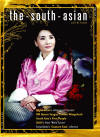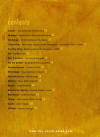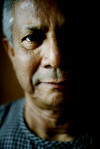|
|
the-south-asian.com August 2007 |
|
|||
|
Famous
Bazaars
Remaining
articles
Books Between
Heaven and Hell
|
|
||||
|
Bangladesh NGOs going global By Akhil Bakshi Muhammad Yunus, Nobel Peace Laureate 2006Photos-Linda Næsfeldt © Nobel Peace Center, Oslo, Norway. "Eighty percent of the poor families in Bangladesh have already been reached with micro credit. We are hoping that by 2010, 100 per cent of the poor families will be reached." Muhammad Yunus, Nobel Peace Laureate 2006 Bangladesh leads the world in having the largest number of non-governmental organisations – NGOs. It has over 20,000 NGOs working in its 86,000 villages. In a country of 147 million people, 3000 to a square km, with 40% living below the poverty line, there is no dearth of issues. While 60 per cent of the population is landless, 10 per cent of the rural households possess 50 per cent of the arable land. The rest survive, against tremendous odds, on a sliver of land. With floods sweeping the country every year and catastrophic cyclones killing hundreds of thousand people every other year, Bangladesh is a nation in perpetual crisis. Micro-credit schemes have benefited millions of people, 90 per cent of them women. NGOs in Bangladesh are the real forces of regional and, increasingly, global integration. The success and effectiveness of NGOs in Bangladesh has turned them into models for replication elsewhere in the world – today they have a strong presence in Afghanistan, Sri Lanka, Cambodia, Philippines, Ethiopia, and many countries in the Caribbean and Latin America. With their success in fighting poverty, the NGOs have become a threat to vested interests, whose shortcomings have been exposed by the grassroots organisations. Some of the NGOs have mushroomed into giants, with budgets greater than that of many of the federal ministries. BRAC (Building Resources Across Communities formerly known as the Bangladesh Rural Advancement Committee) employs more people than any other NGO in the world. It has 37,000 full-time employees, 53,000 part-time teachers, and 2.3 million members (96 percent female) in 65,000 villages, and runs more than 30,000 schools. The Grameen (Village) Bank pioneered small loans to the poor, stepping in where commercial banks feared to tread – giving loans to people without assets. Organising borrowers into groups that guarantee a loan to any member – thereby exerting peer pressure for repayment – its repayment rate is over 95 percent. Other NGOs have followed this route, and now more than 6 million poor people, mostly women, have obtained small loans for shops, sewing machines, chicken farming and the like. By directing education, jobs, and credit towards women, the NGOs have created a social revolution in a conservative Muslim society. The fertility rate in Bangladesh crashed from 6.1 births per woman in 1980 to 3.4 births in 2000. It is expected to decline to 2.5 by 2010. The once-starving nation now has a 2 million tonne food surplus. The literacy rate has doubled. Much of the credit goes to the NGOs. The NGOs receive more than $250 million each year from foreign funds. The only opposition to the NGOs has come from the ultra right religious clergy – for eroding the traditional male-dominated bastion by empowering the women economically. Several impressive projects are run or have been initiated by NGOs. A hatchery, established in 1990 with foreign funds, has grown from humble beginnings into a full-scale enterprise, producing 4000 kg of fish seedling every year for supply to fish farms. Starting with only one tank, it reinvested all profits into the business, increasing the number of tanks to eighteen. Micro credit was born in Bangladesh. What began as a pilot project in the mid 70s, Grameen Bank and its founder Mohammed Yunus were awarded the Nobel Peace Prize in 2006. The United Nations proclaimed the year 2005 as the International Year of Microcredit - as an instrument for socioeconomic development – a call to build inclusive financial sectors and strengthen the powerful, but often untapped, entrepreneurial spirit existing in communities around the world. "I believe that we can create a poverty-free world because poverty is not created by poor people. It has been created and sustained by the economic and social system that we have designed for ourselves; the institutions and concepts that make up that system; the policies that we pursue."
|
|||||
|
Copyright © 2000 - 2007 [the-south-asian.com]. Intellectual Property. All rights reserved. |
|||||


